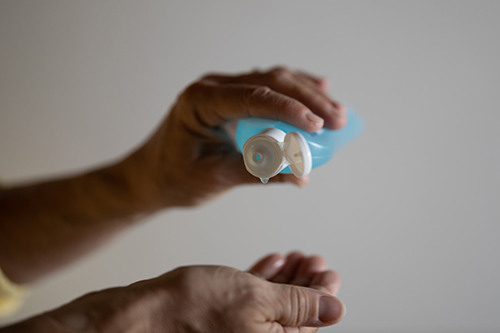Make Your Own DIY Hand Sanitizer
Can’t get your hands on hand sanitizer? Make your own DIY Hand Sanitizer using a simple formula provided by Healthline.com.

Soap and Water is Best
Before we dive into the fun DIY stuff it is important to note that the Centers for Disease Control and Prevention (CDC) says washing your hands with soap and water is still the preferred method to avoid getting sick and spreading germs to those around you. The reason for this starts at the molecular level. Viruses are encased in a lipid “envelope” that soap easily ruptures. Essential proteins from the ruptured membrane spill into the water killing the bacteria and rendering the virus useless. Soap may seem gentle and soothing to us, but from the perspective of microorganisms, it is extremely destructive. The second thing soap and water do is physically pry the microorganisms off as you rub your hands together rinsing them away.
Hand Sanitizer
While washing your hands with soap and water is preferred, it is often not the most convenient if you are out and about. The next best option, according to the CDC, is to use an alcohol-based hand sanitizer that contains at least 60% alcohol. However, unless you have hand sanitizer stockpiled it may be hard to find any in the stores right now. The good news is if you can’t find hand sanitizer at the store it only takes three ingredients to make your own at home: isopropyl or rubbing alcohol (99% alcohol volume), aloe vera gel and essential oil.
The key to making an effective, germ-killing hand sanitizer is to stick to a 2:1 proportion of alcohol to aloe vera. This keeps the alcohol content around 60%. This is the minimum amount needed to kill most germs, according to the CDC’s article “When & How to Use Hand Sanitizer in Community Settings.”
What you’ll need:
- 3/4 cup of isopropyl or rubbing alcohol (99%)
- 1/4 cup of aloe vera gel (to help keep your hands smooth and to counteract the harshness of alcohol)
- 10 drops of essential oil, such as tea tree, lavender, or ginger oil or you can use lemon juice instead.
Directions:
Pour all ingredients into a bowl, ideally one with a pouring spout like a glass measuring container.
Mix with a spoon and then beat with a whisk to turn the sanitizer into a gel.
Pour the ingredients into an empty bottle for easy use, and label it “hand sanitizer.”
When you apply the hand sanitizer, make sure you rub your hands until your hands are dry (30-60 seconds). It can take at least 60 seconds, and sometimes longer, for hand sanitizer to kill most germs.
Warning: Things to Consider
- Tools used for the creation of homemade hand sanitizer should be sterile so bacteria, fungi, and viruses are not introduced into the hand sanitizer. This includes your hands.
- Certain essential oils can cause contact sensitization or allergic reactions.
- Do not use homemade hand sanitizer on children’s skin as they may be more prone to use them improperly, leading to a greater risk of injury.
- The main ingredients — alcohol and aloe vera gel — are now nearly as hard to find as store-bought sanitizer.
- Only use homemade hand sanitizer in extreme situations when handwashing is not available for the foreseeable future.
Got Medicare Questions?
We hope that this information on homemade hand sanitizer is useful to you.
Let us help you answer your questions so that you can get back to the activities that you enjoy the most.
Call (888) 446-9157, click here to get an INSTANT QUOTE, or leave a comment below!
See our other websites:

